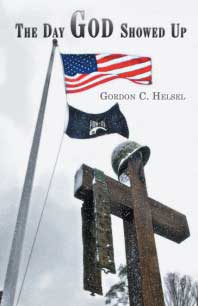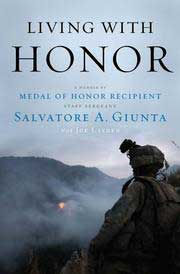
FGF E-Package
The Confederate Lawyer
May 22, 2013
Two Wars, Two Books
by Charles G. Mills
fitzgerald griffin foundation
The Day God Showed Up by Gordon C. Helsel.
softcover and ebook, 92 pages (WestBowPress, Bloomington, 2013)
Living with Honor: A Memoir by Salvatore A. Giunta.
hardcover, softcover, Kindle, audio book,
304 pages (Threshold Editions/Simon & Schuster, New York, 2012)
GLEN COVE, NY — Two books published within the last half year strikingly illustrate the similarity of combat in the Vietnam and Afghanistan wars, as well as the important differences between them.
Gordon C. Helsel, author of The Day God Showed Up, (92 pages, WestBowPress, Bloomington, 2013) is now a member of the Virginia legislature. He was one of hundreds of thousands of young men who were drafted, given 16 weeks of training, and quickly sent to fight in Vietnam for one year, less if killed or seriously wounded. This system meant that responsibility came quickly to very young men with little training, little enthusiasm for war, and little experience. Helsel became a team leader, with responsibility for three or four of his fellow infantry soldiers. Two teams made up a squad led by a sergeant or staff sergeant. He also became, without formal training, an explosives expert.
Helsel tells the story of his training, his learning how to fight in Vietnam, his Christmas in Vietnam, and his serious injury and recovery. He also relates the birth of his sons and his prostate cancer caused by his exposure to defoliants in Vietnam.
The heart of his book begins with the events of February 27, 1968. On that day, Helsel and about 50 members of his company were sent on a search-and-destroy mission against a much larger enemy force. Suddenly, they were ambushed and surrounded on three sides by the enemy. Helsel found himself shielded from enemy fire by the body of a dead comrade.
During a lull in the fighting, Helsel ran to join his commanding officer and was severely wounded in his left arm. (He is left-handed.) It was probable that he would bleed to death, but miraculously he did not. The reader will have to acquire the book to learn how he escaped this fate.
Despite two bouts of malaria during his recovery, Helsel survived. He was able to rejoin the young wife he left behind and have two sons and a political career.
Military medicine is far better today than it was during the Vietnam war. About 70 percent of seriously wounded Americans in Vietnam died. Today, only about 10 percent of those seriously wounded in combat die. The soldiers of the 21st century are volunteers, and the mix is less skewed toward the inexperienced than in Vietnam. Modern soldiers go through extensive training with the unit with which they will deploy. Their helmets and body armor are much better than the equipment used in Vietnam. Much of the ammunition used in Vietnam was substandard.
Superior medicine, training, and equipment might have saved Helsel's life, but in Vietnam his life was strictly saved by God. His book is essentially a spiritual one. If Helsel's book is about the theological virtue of faith, Giunta's book, Living With Honor: A Memoir (304 pages, Threshold Editions/Simon & Schuster, New York, 2012), is about the cardinal virtue of fortitude.
Unlike Helsel, Giunta was not drafted; there was no draft during the Afghanistan and Iraq wars. He went to an Army Recruiting Station to get a free t-shirt, and the idea of enlisting remained in his mind. The attack on the World Trade Center inspired him to actually do it. After the initial two phases of training, he went to airborne school and became a paratrooper. He then volunteered for Ranger School but had to wait so long for a place to open up that he withdrew his application in order to speed up his chance to kill the enemy.
He was assigned to an Airborne Infantry Brigade in Aviano, Italy, which was training for Iraq. Unlike the raw young men thrown into Vietnam, soldiers today go to war with fellow soldiers with whom they have trained extensively. Eventually, the brigade was sent to Afghanistan, not Iraq. Like Helsel, he became a team leader.
He was injured but returned to duty. The length of his enlistment was involuntarily extended.
While in his second deployment in Afghanistan, he was shot. Despite his injury, he charged the enemy, firing, and dragged one of his comrades back to safety. He then saw two men carrying a third one by his feet and hands. He realized that the two were insurgents, and they were carrying an American. With no regard for his own safety, he shot them, killing one and injuring the other, and rescued the American. He was nominated for the Medal of Honor.
Giunta became a staff sergeant. After his extended enlistment ended, his Medal of Honor was approved and awarded to him by the President. He is the first living person to have received the Medal of Honor for action in Afghanistan.
The soldiers of Giunta's era were far better trained, motivated, and equipped than those of Helsel's; if they are injured, they received much better care. Vietnam claimed tens of thousands of lives. Iraq and Afghanistan have sent home tens of thousands of severely injured soldiers.
The two authors went to war as immature young men. They came home injured but with a mature and admirable sense of obligation to help others and today lead altruistic lives. There is, however, a common message that Helsel and Giunta leave us in their books. Helsel frames it in religious terms, Giunta does not, but the message is the same. The two authors went to war as immature young men. They came home injured but with a mature and admirable sense of obligation to help others and today lead altruistic lives.
Helsel's faith and Giunta's fortitude both produced the greatest virtue, Charity.
The Confederate Lawyer archives
Charles Mills, Esq. served in the Army from 1962 to 1964. He is the Judge Advocate (general counsel) to the New York State American Legion. He has a B.A. from Yale in Latin and Greek; a law degree from Boston College; and an LI.M degree from Touro College in which he focused on veterans' benefits and Constitutional law.
The Confederate Lawyer column is copyright © 2013 by Charles G. Mills and the Fitzgerald Griffin Foundation, www.fgfBooks.com. All rights reserved.
This column may be forwarded, posted, or published if credit is given to Charles Mills and fgfBooks.com.
Charles G. Mills is the Judge Advocate or general counsel for the New York State American Legion. He has forty years of experience in many trial and appellate courts and has published several articles about the law.
See his biographical sketch and additional columns here.
To sponsor the FGF E-Package, please send a tax-deductible donation to the:
Fitzgerald Griffin Foundation
344 Maple Avenue West, #281
Vienna, VA 22180
1-877-726-0058
publishing@fgfbooks.com
or donate online.
@ 2025 Fitzgerald Griffin Foundation

